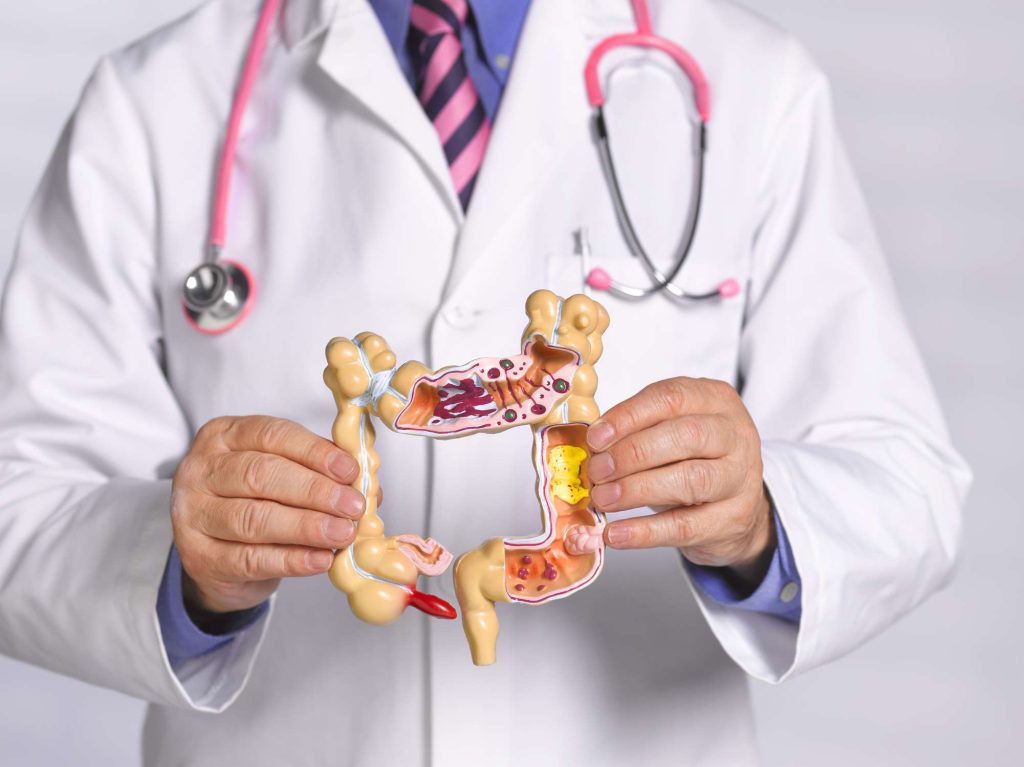Colon Diseases Symptoms & Treatment
Colon, or large intestine, is part of the digestive system. It is a long, hollow tube at the end of the digestive system where the body produces and stores stool. Many disorders affect the colon’s ability to function properly. These include diverticulitis, inflammatory bowel diseases such as Crohn’s disease and ulcerative colitis as well as polyps and colon cancer. The early diagnosis colon diseases and their symptoms, and especially colon cancer, is extremely important for their effective treatment and the prevention of health-threatening complications.

Diverticulitis
Colonic diverticula are small pouches or pouches in the lining of the intestine that occur when the lining is pushed through weak points in the muscle of the intestinal wall. They usually appear in the sigmoid colon, where the colon exerts the most pressure. When one or more of these formations become inflamed and in some cases infected, diverticulitis occurs. Diverticulitis can cause severe abdominal pain, fever, nausea and a significant change in bowel habits.
Mild diverticulitis can be treated with rest, dietary changes, and antibiotics. Severe or recurrent diverticulitis in many cases requires surgery. The operation involves removing the affected part of the large intestine and reuniting the two ends together. This operation is called a colectomy and is now mostly performed laparoscopically, i.e. a laparoscopic colectomy. If extensive swelling is found, the surgeon may make an opening in the abdominal wall so that the stool can be collected in a special bag outside the body (colostomy). The ends of the colon are then often reattached after the inflammation subsides.
Inflammatory bowel diseases (IBD)
Inflammatory bowel diseases include ulcerative colitis and Crohn’s disease. Ulcerative colitis is a form of inflammation of the bowel that causes diarrhea, abdominal pain, stools that are accompanied by blood or mucus, fever, weight loss, and swelling of the hips, lungs, knees, eyes, or skin. These symptoms occur due to the development of inflammation and ulcers in the large intestine, and can be either mild or more severe. They may appear once or have frequent recurrences. The disease is initially treated conservatively, with the administration of medication and following a special diet. In some cases, the administration of cortisone or immunomodulating medication is recommended.
Crohn’s disease is a chronic form of inflammatory bowel disease. The condition causes inflammation and irritation of the digestive tract, especially the small and large intestines. Crohn’s disease can cause diarrhea, abdominal pain, feeling tired, weight loss, fever, rashes, joint pain, redness in the eyes, and fistulas or abscesses in the anal area. It is common for periodic flare-ups of the disease’s symptoms to occur. For the relief of the symptoms, conservative treatment is initially recommended with a change in eating habits, smoking cessation and the administration of medication such as cortisone. Both diseases in an advanced stage are treated with colectomy surgery, in order to remove the affected part of the large intestine.
Colon polyps
A polyp is a growth that forms on the inner lining of the colon. Polyps are benign, meaning non-cancerous, clumps of cells that are often small and cause no or minimal symptoms. However, some polyps can later turn into colon cancer. There are two main types of polyps, hyperplastic, which are benign and do not have the potential to develop into cancer, and adenomatous, which are a precancerous form of polyps meaning they have the potential to turn into cancer.
Most colon polyps do not cause symptoms. If symptoms do occur, they may include blood in your underwear or toilet paper after a bowel movement, blood in your stool, constipation or diarrhea that may last more than a week. Removing polyps before they develop serious changes and increase in size can prevent progression to colon cancer. A colonoscopy can prevent colon cancer by finding and removing the specific growths. If removal during colonoscopy is not possible, surgical removal of the part of the intestine where the polyp is located by colectomy is indicated. Colon diseases and their symptoms generally can be managed with conservative measures, however, there are a few cases where surgery is incidated in order to avoid serious complications. The recommended surgical procedure in that case is laparoscopic colectomy.

